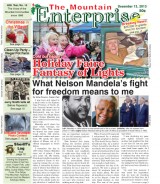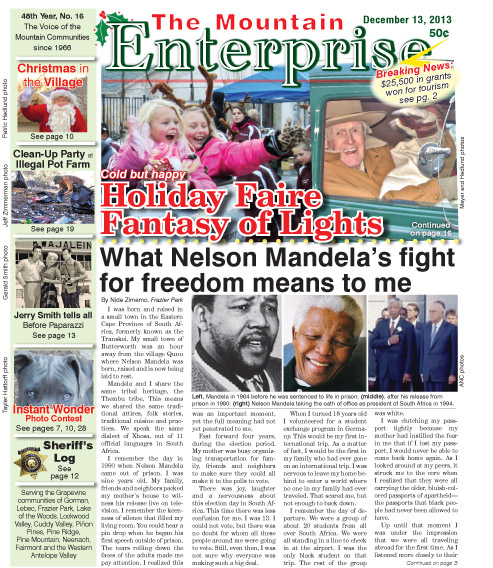By Nide Zimemo, Frazier Park
I was born and raised in a small town in the Eastern Cape Province of South Africa, formerly known as the Transkei. My small town of Butterworth was an hour away from the village Qunu where Nelson Mandela was born, raised and is now being laid to rest.
Mandela and I share the same tribal heritage, the Thembu tribe. This means we shared the same traditional attires, folk stories, traditional cuisine and practices. We speak the same dialect of Xhosa, out of 11 official languages in South Africa.
I remember the day in 1990 when Nelson Mandela came out of prison. I was nine years old. My family, friends and neighbors packed my mother’s house to witness his release live on television. I remember the keenness of silence that filled my living room. You could hear a pin drop when he began his first speech outside of prison. The tears rolling down the faces of the adults made me pay attention. I realized this was an important moment, yet the full meaning had not yet penetrated to me.
Fast forward four years, during the election period. My mother was busy organizing transportation for family, friends and neighbors to make sure they could all make it to the polls to vote.
There was joy, laughter and a nervousness about this election day in South Africa. This time there was less confusion for me. I was 13. I could not vote, but there was no doubt for whom all these people around me were going to vote. Still, even then, I was not sure why everyone was making such a big deal.
When I turned 18 years old I volunteered for a student exchange program in Germany. This would be my first international trip. As a matter of fact, I would be the first in my family who had ever gone on an international trip. I was nervous to leave my home behind to enter a world where no one in my family had ever traveled. That scared me, but not enough to back down.
I remember the day of departure. We were a group of about 20 students from all over South Africa. We were all standing in a line to check in at the airport. I was the only black student on that trip. The rest of the group was white.
I was clutching my passport tightly because my mother had instilled the fear in me that if I lost my passport, I would never be able to come back home again. As I looked around at my peers, it struck me to the core when I realized that they were all carrying the older, bluish-colored passports of apartheid—the passports that black people had never been allowed to have.
Up until that moment I was under the impression that we were all traveling abroad for the first time. As I listened more closely to their conversations, I could hear the girls giggling and exchanging stories of their past holidays when they had traveled to America and other parts of the world with their families.
They continued to boast about how many stamps they had in their bluish passports. I looked down at my own passport, clutched so tightly in my hand. It was green, shiny and brand new, a post-apartheid-era passport without a single travel stamp in it.
Suddenly I was overwhelmed by anger and jealousy. Up until that moment I had believed that every South African’s holiday consisted of going to the beach and visiting grandma’s house.
The citizens holding those bluish-colored passports had enjoyed the freedom to travel anywhere in the world since they were born.
My family had not had that same freedom. This realization tore my heart to shreds. I remember that moment as surreal and dramatic. It had a profound impact on me. Until that instant I had not realized what Nelson Mandela had done for me. Now I understood. This was the freedom everyone had been talking about.
In 2009, in Burbank, California I did voice-overs for the movie Invictus at the Warner Brothers Studio. The movie is about Nelson Mandela as the newly-elected president of South Africa. It tells the story of his leadership and how he brought South Africans together through the Rugby World Cup. Rugby had always been the exclusive sport of white South Africans.
I recalled 1995 when I was 14. The school shut down early one day because this was the first time South Africa had played rugby on an international level. Everyone wanted to be in front of a TV screen to cheer on our team. This event was powerful.
After all the years of segregation and the racial divide, for the first time in our national history we saw black, white, Indian and mixed-race athletes standing together as one team. Our hearts beat in tandem, supporting our national rugby team. We won the Rugby World Cup!
Now I live here in the United States, in the Mountain Communities. My passport is filled with numerous stamps, and I have traveled to many countries of the world. Two days before the man who dedicated his life to make such things possible for all South Africans died, I got one of my residual checks for Invictus.
I never had the opportunity to meet Nelson Mandela in person, but I feel honored to have shared a heritage with him. In our culture, death is treated in a special way.
After the tears, the mourning and the funeral, we wash our hands and get ready for an “After Tears” celebration party. We celebrate the life that has passed with laughter, music, dancing and drinking.
We do not need to mourn for Nelson Mandela. My last words to him are “thank you, thank you.”
We will celebrate his legacy by promising to let it continue through each of us.
Nide Zimemo lives in Frazier Park. She works part-time with The Mountain Enterprise. She has been in the U.S. for 13 years with a green card and plans to become a U.S. citizen.
To see full stories with photos, please go to <a href=”https://mountainenterprise.com/e-edition/131213″>The Mountain Enterprise e-Edition</a>
<p>
(login required)
<i>You can have your newspaper delivered via mail! Just call 661-245-3794.</i>
Also, this story and others are available right now at newsstands throughout the Mountain Communities.
This is part of the December 13, 2013 online edition of The Mountain Enterprise.
Have an opinion on this matter? We'd like to hear from you.

![Nide Zimemo (right) with her son Nehemiah, 7 (sitting on a counter next to Mom). Zimemo has lived in the U.S. for 13 years, but was born and raised in South Africa. She is reflecting on Nelson Mandela’s impact on her life. [photo by Gary Meyer]](https://mountainenterprise.com/wp-content/uploads/IMG_0465.jpg)

